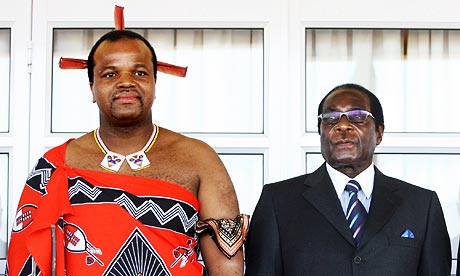
Innermost thoughts of*
Swaziland - Mswati III, King

“I, King Mswati III, am proud to be Africa’s last absolute monarch. I use and abuse my royal prerogatives, collecting wives (so far I have 13 of them) and amassing riches while my subjects die of thirst. I got a private jet for my birthday and, in return, I give limousines to my close relatives. Life is short so I’ve decided to enjoy myself.
I’m delighted to have an effective government. Effective in terms of governance and implementing health programmes? No, forget that. Around 40 per cent of the population is infected with HIV, poverty is on the rise, the economy is not viable and foreign investors have thrown in the towel. But that doesn’t keep me awake at night. I mean it is effective at controlling the information put out by the press and discouraging those idiotic journalists who think they can criticize me. That kind of effective!
My aides issue reminders to journalists on my behalf. In 2010, my brother, Prince Mhalaba, said journalists who kept on writing bad things about our kingdom would be killed. Two years before that, my justice minister, Majahekhaba Dlamini, issued a public warning that journalists who criticized the government would be arrested and charged with terrorism. The “suppression of terrorism” law provides for sentences of up to 25 years in prison. That should dissuade them.
Intimidation is an effective policy. Self-censorship is now routine. It is hard to imagine anyone criticizing me or other senior officials nowadays. Two journalists, Mfomfo Nkambule of the Times of Swaziland, the country’s only privately-owned newspaper, and Mario Masuku of the Times Sunday, were forced to stop writing their columns in 2009.
When a handful of idiots took the street to demand my departure in 2011 and 2012, we arrested the Swazi and foreign journalists who went to cover their pseudo-demonstrations. When the editor of the magazine The Nation was found guilty of contempt of court in 2013, he was sentenced to a fine of 200,000 emalangeni (more than 16,000 euros) or two years in prison if the fine was not paid. Enough to silence him and encourage his colleagues to do the same.”



